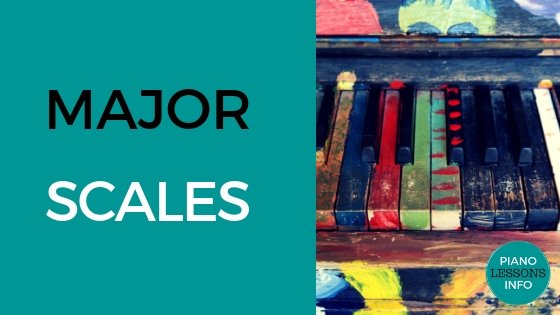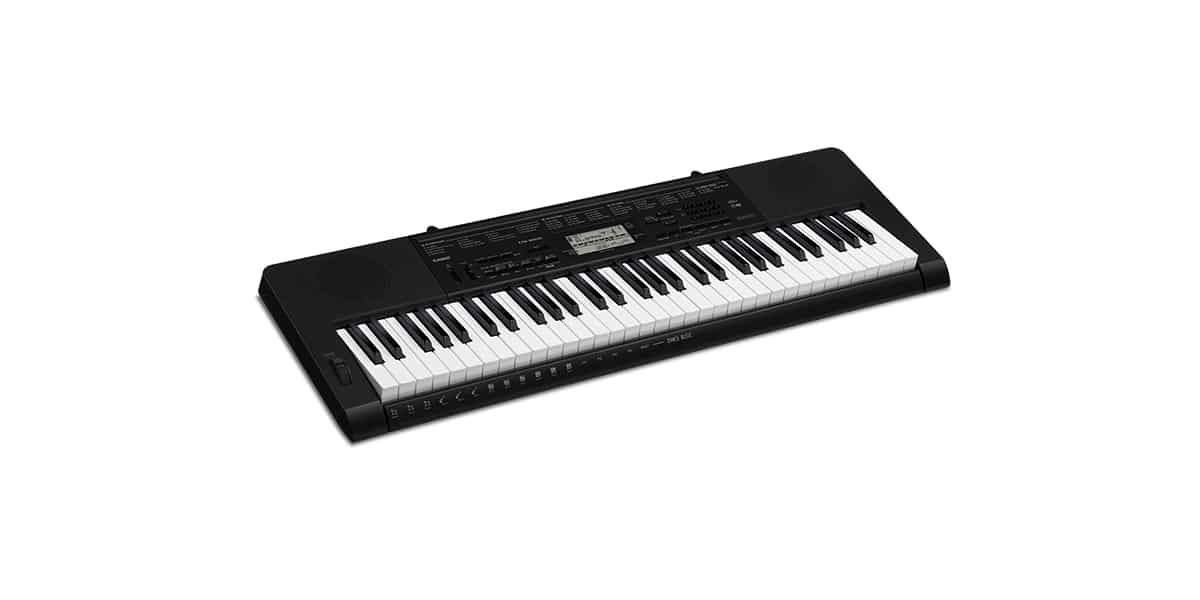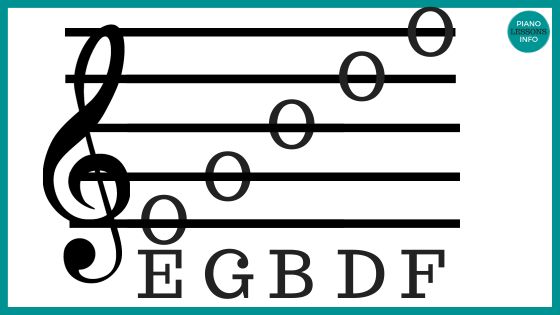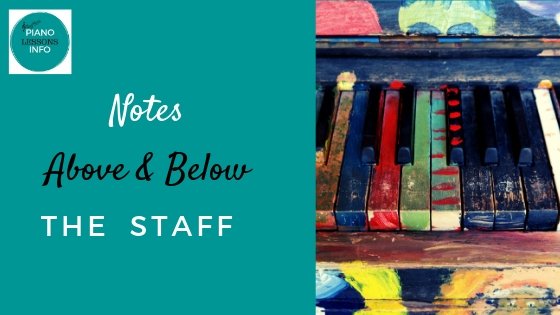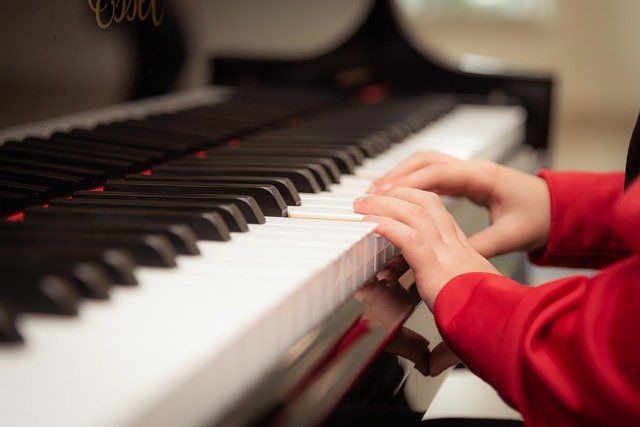What Are the Piano Key Notes?
The piano keyboard is essentially a pattern. To learn piano key notes, you need to learn the pattern.
And the pattern is easy to learn.
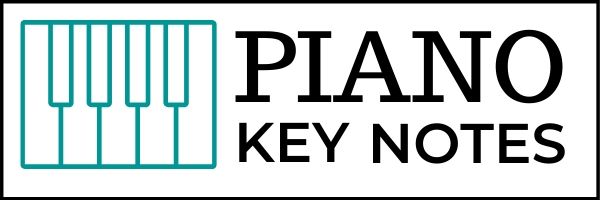
The first thing you see on the keyboard is that there are white keys and black keys. Look at the picture below and notice the sets of black keys.
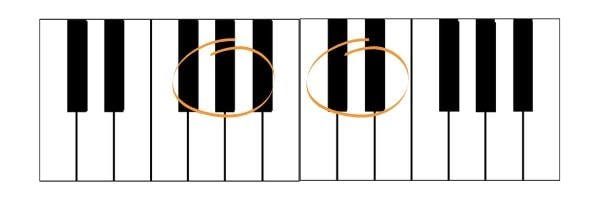
There are groups of black keys. Groups of 2 and groups of 3. These groups will help you to know what every other piano key is.
Important! Note that the piano key notes go from low to high. When sitting at a keyboard, the low notes are to your left and the high notes are to your right.
(Have you got your piano or keyboard? If not, check out the buying guided here. That'll help you pick the right one for learning piano.)
Piano White Key Names
Let’s start learning the white piano key notes. We’ll start by looking at the group of 2 black notes. There are 3 white notes surrounding this group of 2. They are C, D, and E.
Every white key is named after a letter. It’s the “musical alphabet.” The musical alphabet starts on A and ends on G. Then it repeats. For example: A, B, C, D, E, F, G, A, B, etc.
Look below at the picture of the group of 2 black notes. The note in the middle of the 2 is D. On the entire piano, you call the note in the middle of the group of 2 black notes “D”.

Now just like the English alphabet, C comes before D and E comes after D. So, on the piano keyboard, C is lower than D and E is higher than D. This is the same for the entire piano keyboard.

You can find all other piano key notes from these if you wanted. If you start on E, just keep going higher by repeating the musical alphabet.
Next, we have the group of 3 black notes. On the left of the group of 3 we have F. On the right, B. Look at the picture below. What comes after F? What comes before B?

If you think of the musical alphabet, G comes after F. A comes after G and before B.
Now here they are all together. This pattern repeats itself over and over on the piano keyboard.
You now know all the names of the white keys!
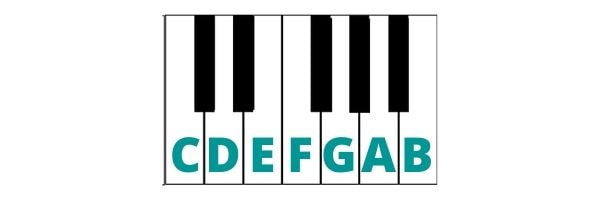
Piano Black Key Names
The black keys also have names. They can be called by 2 names (for now). One is a sharp and one is a flat.
A sharp is made by going higher.
A flat is made by going lower.
Look above at D. The black note to the right of D is called D sharp (D#). The black note to the left of D is called D flat (Db). Another name for D# is E flat (Eb). Another name for Db is C sharp (C#).
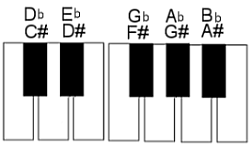
Notice that there are some pairs of white keys with no black key in the middle. With these pairs (C and B, F and E), making a sharp or flat may mean playing another white key. For example, Cb is B. B# is C.
A note with a sharp will be the next note to the right, no matter if it's white or black.
A note with a flat next to it will be the next note to the left, no matter if it's white of black.
Time To Practice!
Now that you know what the notes are, you need to practice them to really get them in your head. Then you won’t have to look anymore.
Here are some things you can do to learn this:
- randomly pick notes on the keyboard and seeing how quickly you can name them
- draw a diagram of the keys and fill in the notes
- play every C, D, E etc on your entire piano keyboard
- write down the musical alphabet on sticky notes or small pieces of paper then flip them over and find the note
You need to feel really comfortable with the names of the notes before moving on or it will slow you down.
Next Steps
You can now go one of two directions - or both even.
If you know the note names, you can begin to learn chords. Start with What Are Piano Chords or get the free chord chart below. (This will start you off with an email sequence that teaches you about chords.)
Learning chords is a pretty quick way to start learning and playing piano.
The other thing you can begin to do is learn to read music. The best place to start is read piano notes.
Now you know the pattern and all of the notes!
Piano Keys Quizzes and Games
Try more piano music note quizzes like this.
In this next game drag the notes to the correct container,
Play more piano quiz games to help you learn!
Free Download
Return from Piano Key Notes to Piano Lessons Homepage.
Free Download:
Ultimate Chord Cheat Sheet
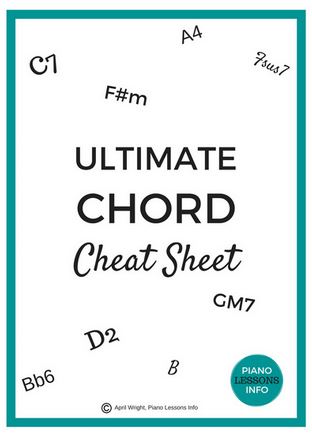
Subscribe below and get free access to the (printable) Ultimate Chord Cheat Sheet.


